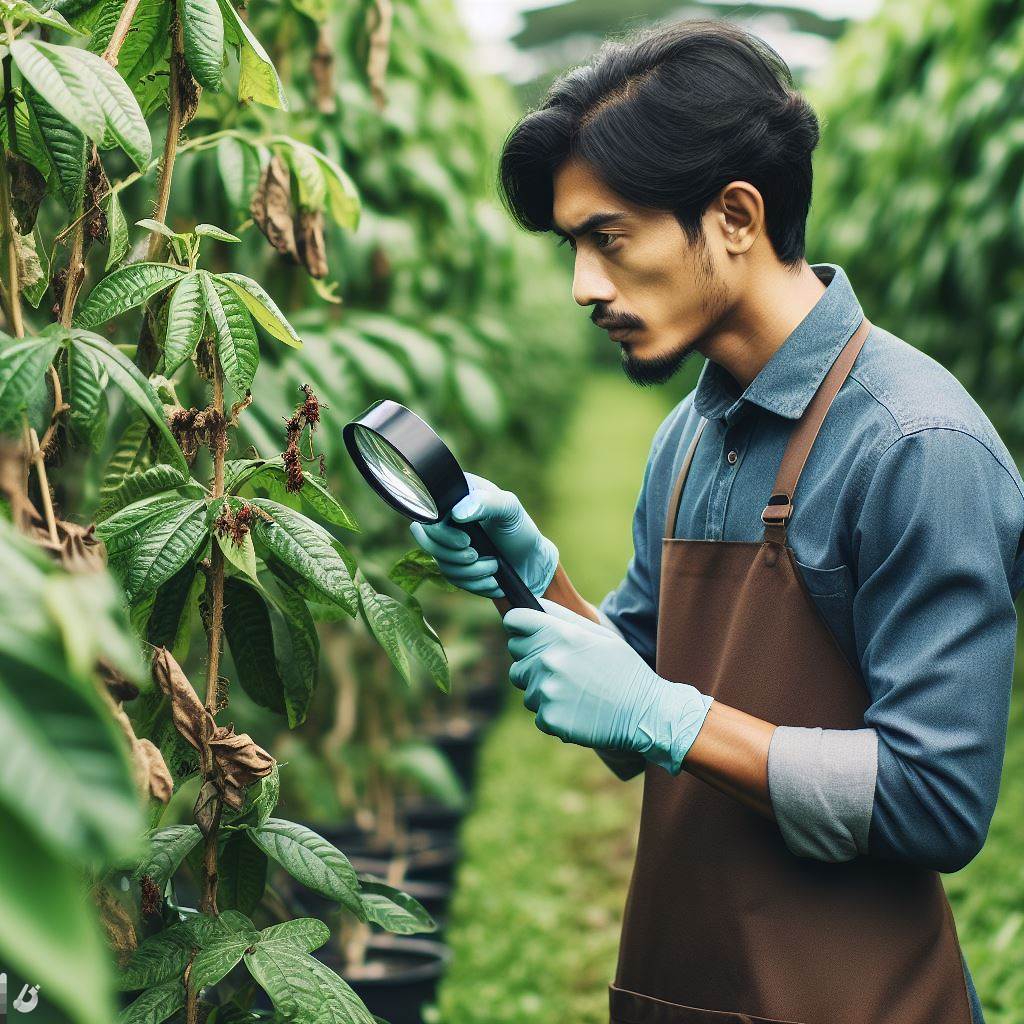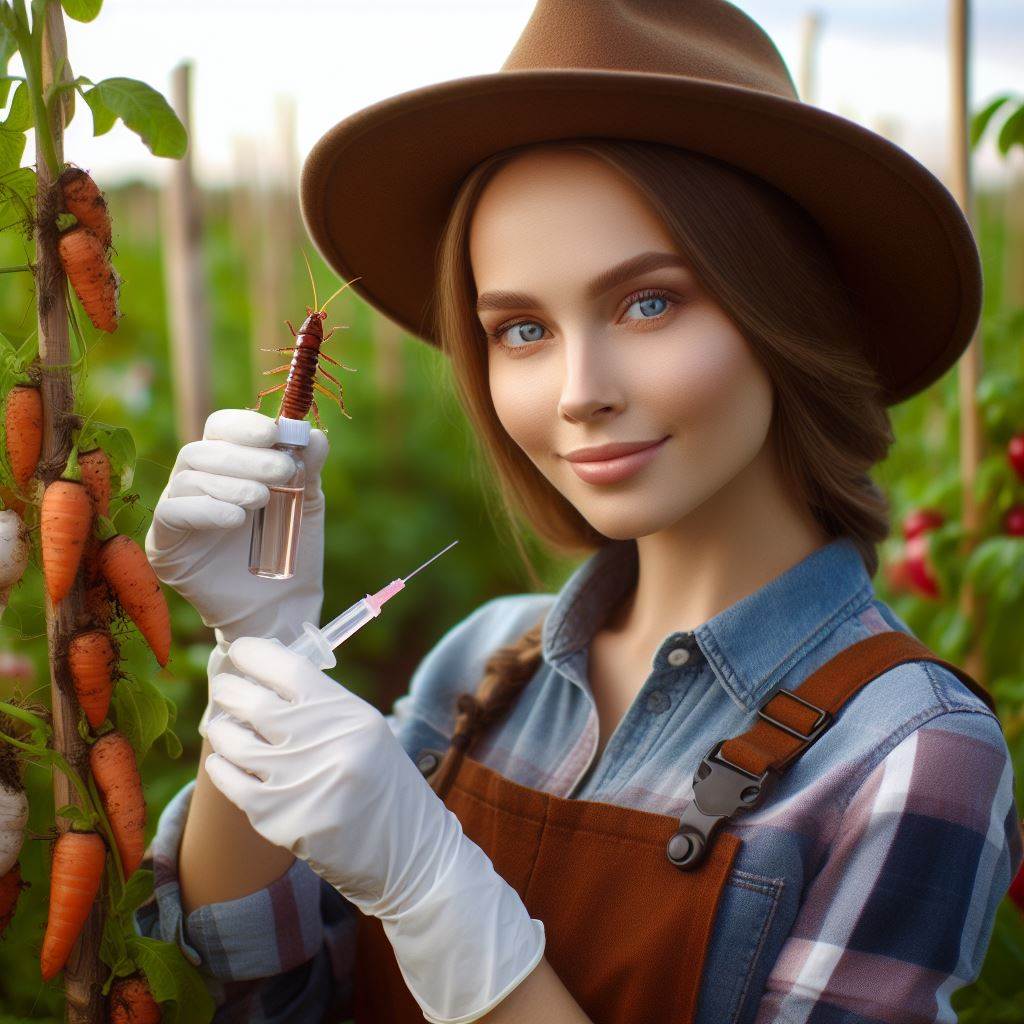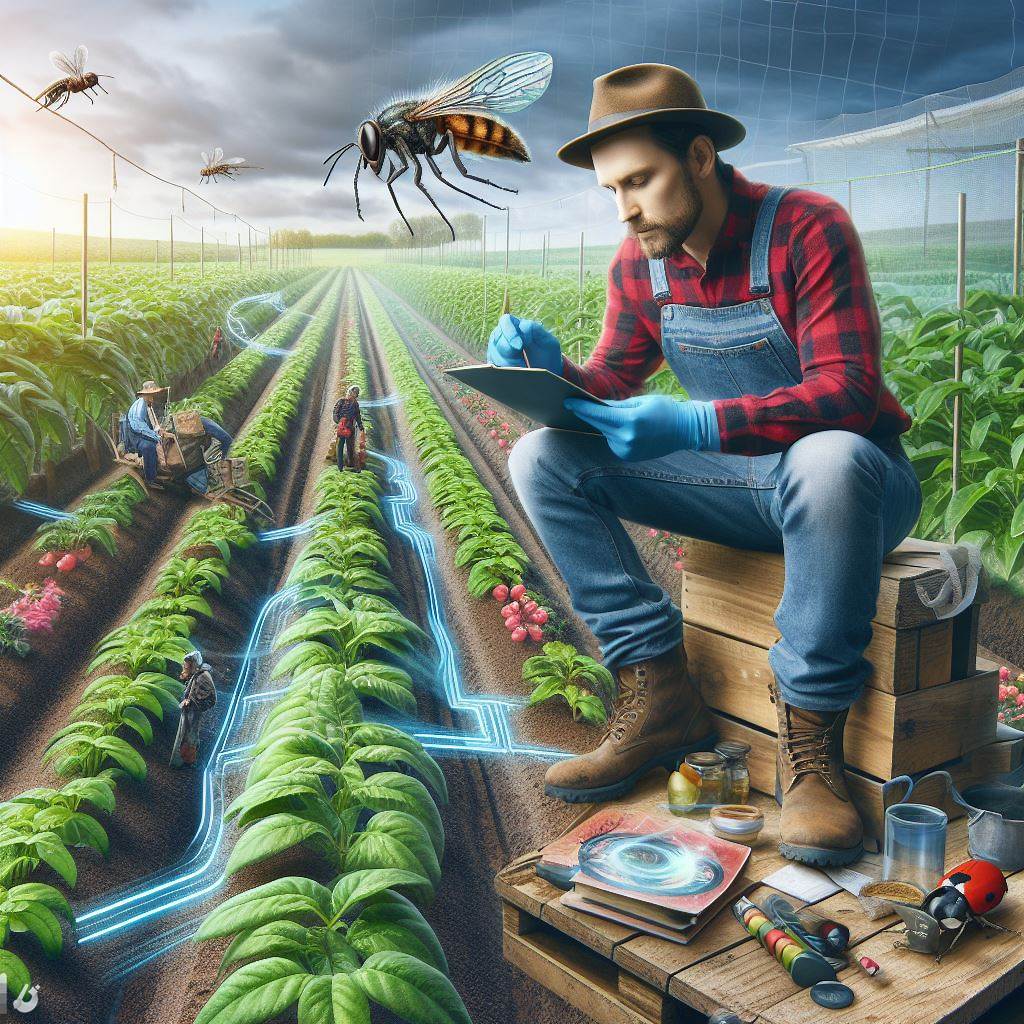Introduction
Let’s explore sustainable farming: IPM success stories.
Sustainable farming refers to agricultural practices that focus on long-term environmental stability and profitability.
Sustainable farming is important because it promotes soil health, biodiversity, and protects natural resources.
Embarking on a journey through the fertile fields of sustainable farming, we find ourselves immersed in a tapestry woven with the threads of environmental consciousness and agricultural ingenuity.
Sustainable farming transcends mere cultivation; it embodies a holistic ethos that nurtures ecosystems, safeguards biodiversity, and ensures the longevity of our food systems.
At the heart of this agricultural evolution stands Integrated Pest Management (IPM), a sophisticated strategy that orchestrates a delicate balance between natural predators, crop rotation, and judicious pesticide use.
The success stories that unfold within this narrative are not just tales of increased yields or reduced environmental impact; they are testimonials to the symbiotic relationship between humans and the land.
As we traverse the landscapes where sustainable farming practices flourish, we encounter farmers who have become stewards of the earth, implementing IPM with precision.
These success stories resonate with the resilience of nature and the adaptability of agricultural communities, showcasing how innovation can coexist with tradition.
Join us in this exploration, where each success story serves as a testament to the transformative power of sustainable farming and IPM.
Together, we unravel the intricate dance between cultivation and conservation, painting a vivid picture of a future where the roots of agriculture run deep, anchoring us to a sustainable and thriving tomorrow.
What is Integrated Pest Management (IPM)?
Definition of IPM
- Integrated Pest Management (IPM) is an approach that focuses on sustainable and environmentally friendly pest management.
- It involves using a combination of methods to prevent and control pests while minimizing harm to human health and the environment.
- IPM integrates multiple strategies, such as biological control, cultural practices, habitat manipulation, and judicious use of pesticides.
- It emphasizes the use of non-chemical methods as the primary approach to pest control.
Objectives of IPM
- The main objective of IPM is to reduce the reliance on chemical pesticides, which can have negative impacts on the environment, wildlife, and human health.
- IPM aims to maintain pest populations below economically damaging levels rather than attempting to eradicate them completely.
- It strives to preserve the natural enemies of pests, promoting biological control and reducing the need for chemical interventions.
- Other key objectives of IPM include minimizing pesticide resistance, conserving biodiversity, and promoting overall ecosystem health.
Components of IPM
- Identification and monitoring of pests is a crucial component of IPM.
- By accurately identifying pests and their life cycles, farmers can target specific vulnerabilities and develop appropriate control strategies.
- Prevention is the cornerstone of IPM, focusing on cultural and mechanical practices that make environments less conducive to pests.
- This includes practices like crop rotation, selection of pest-resistant varieties, and optimizing irrigation and fertilization.
- Biological control is another component of IPM, utilizing natural enemies of pests, such as predators and parasites, to keep populations in check.
- When necessary, IPM incorporates the use of pesticides, but only as a last resort and in a targeted manner.
- Chemical interventions are carefully chosen based on their effectiveness against the specific pest while minimizing harm to beneficial organisms.
- Regular monitoring and evaluation of IPM practices help assess their effectiveness and make adjustments if necessary.
In short, Integrated Pest Management (IPM) is a holistic approach to sustainable farming that aims to reduce the reliance on harmful chemical pesticides.
IPM combines various strategies, such as biological control, prevention, and targeted pesticide use, to manage pests while minimizing environmental impacts.
By implementing IPM practices, farmers can maintain pest populations at manageable levels, protect natural enemies of pests, and promote overall ecosystem health.
Read: IPM Strategies: Safe for Environment
Transform Your Agribusiness
Unlock your farm's potential with expert advice tailored to your needs. Get actionable steps that drive real results.
Get StartedBenefits of IPM in Sustainable Farming
A sustainable farming practice that has gained recognition for its effectiveness is Integrated Pest Management (IPM).
IPM is an approach that focuses on using a combination of techniques to manage pests and minimize their impact on the environment and crop yields.
Here are some key benefits of implementing IPM in sustainable farming:
Decreased use of chemical pesticides
IPM strategies prioritize the use of non-chemical pest control methods, such as biological control agents, cultural practices, and physical barriers.
By reducing reliance on chemical pesticides, farmers can protect beneficial insects and pollinators while minimizing potential risks to human health and the environment.
Reduced environmental impact
With IPM, farmers adopt practices that promote a healthy and balanced ecosystem.
By integrating various pest management strategies, including pest monitoring, crop rotation, and habitat manipulation, farmers can suppress pest populations naturally without causing harm to the environment.
This approach helps to maintain biodiversity and ecosystem services.
Improved crop health and yield
IPM allows farmers to proactively manage pests, optimizing crop health and productivity.
By implementing preventive measures and early detection techniques, farmers can effectively control pests before they cause significant damage.
Healthy crops are more resilient and better able to withstand disease and other stressors, resulting in higher yields.
Cost-effectiveness
Implementing IPM can be a more cost-effective approach compared to relying solely on chemical pesticides.
While initial investments may be required for infrastructure and training, the long-term benefits outweigh the costs.
By reducing pesticide use, farmers can save on chemical inputs and minimize the need for repeated pest control treatments.
Moreover, IPM reduces the risk of pesticide resistance developing in pests.
When pests become resistant to a specific pesticide, farmers often need to use higher doses or resort to different, potentially more toxic chemicals to combat them.
These alternatives can be more expensive and less environmentally friendly.
In short, implementing IPM in sustainable farming offers numerous benefits, including decreased reliance on chemical pesticides, reduced environmental impact, improved crop health and yield, and long-term cost-effectiveness.
By adopting an integrated and holistic approach to pest management, farmers can effectively protect their crops while preserving the environment for future generations.
Read: Understanding IPM in Sustainable Farming
Success Story 1: Organic Fruit Farm
Overview of the farm
- The organic fruit farm is located in a rural area with abundant sunlight and fertile soil.
- The farm grows a variety of fruits, including apples, oranges, peaches, and berries.
- It follows organic farming practices, excluding the use of synthetic pesticides and artificial fertilizers.
- The farm prioritizes sustainability, aiming to maintain soil health and minimize environmental impact.
Implementation of IPM strategies
- The farm employs integrated pest management (IPM) strategies to control pests effectively.
- IPM techniques include using beneficial insects, traps, crop rotation, and maintaining biodiversity.
- Regular scouting of pests and monitoring their population helps in determining suitable pest control methods.
- The farmers focus on preventive measures to reduce pest pressure, such as maintaining proper irrigation and sanitation.
- The use of pheromone traps and sticky traps helps in monitoring and trapping specific pests.
- The farm uses organic pesticides as a last resort when other methods fail to control pests.
Results achieved
- Implementing IPM strategies has significantly reduced pest damage on the organic fruit farm.
- By using beneficial insects and natural pest control methods, the farm has achieved a balanced ecosystem.
- The farm has seen a decrease in disease prevalence, resulting in healthier and better-quality fruits.
- IPM practices have increased biodiversity on the farm, attracting more pollinators and beneficial insects.
- The farm has witnessed a positive impact on yield and profitability, as pest damage is minimized.
Lessons learned
- The importance of biodiversity and maintaining a healthy ecosystem cannot be underestimated in sustainable farming.
- Regular monitoring and scouting play a crucial role in determining appropriate pest control measures.
- Integrated pest management requires patience and continuous learning to understand the complex interactions within nature.
- Collaborating with experts and fellow farmers helps in gaining knowledge and practical insights.
- Success in organic farming relies on a holistic approach, considering soil health, crop rotation, and proper irrigation.
In essence, the success story of the organic fruit farm showcases the effectiveness of implementing IPM strategies.
By prioritizing sustainable practices and using natural pest control methods, the farm has achieved healthier and higher-quality produce.
The lessons learned emphasize the significance of biodiversity, regular monitoring, and collaboration in sustainable farming.
This success story serves as an inspiration for other farmers looking to adopt IPM techniques and contribute to a more sustainable agricultural future.
Showcase Your Farming Business
Publish your professional farming services profile on our blog for a one-time fee of $200 and reach a dedicated audience of farmers and agribusiness owners.
Publish Your ProfileRead: Organic IPM Solutions for Healthy Crops

Success Story 2: Crop Rotation on a Vegetable Farm
Overview of the farm
- The vegetable farm, located in a rural area, specializes in growing a variety of crops.
- It is managed by a team of experienced farmers who emphasize sustainable and eco-friendly practices.
Integration of IPM with crop rotation
- In order to combat pest and disease issues, the farm utilizes an Integrated Pest Management (IPM) approach.
- Crop rotation is a key component of their IPM strategy, where different crops are grown sequentially in distinct sections of the farm.
- This helps prevent the buildup of pests and diseases that are specific to certain crops.
Positive outcomes observed
- The implementation of crop rotation has resulted in reduced pest infestations and disease outbreaks.
- The farmers have noticed enhanced soil fertility and improved crop health over the years.
- Crop rotation has also minimized the need for chemical pesticides and fertilizers, leading to cost savings.
Challenges faced and solutions adopted
- One major challenge faced initially was planning and organizing the crop rotation schedule effectively.
- The farmers overcame this by developing a meticulous crop rotation plan that takes into account factors like crop compatibility and soil requirements.
- Another challenge was managing weeds in between crop rotations.
- The farm tackled this by implementing organic weed control methods such as mulching and manual removal.
- Regular monitoring and scouting for pests and diseases also became essential to detect any issues early on.
- The farmers implemented manual inspections and used sticky traps to capture and monitor pest populations.
- Additionally, they introduced beneficial insects into the ecosystem to control pest populations naturally.
- Continuous learning and adaptation have been crucial in overcoming challenges and optimizing the crop rotation system.
In general, this vegetable farm’s success story of integrating IPM with crop rotation demonstrates the effectiveness of sustainable farming practices.
The careful planning and implementation of crop rotation have contributed to pest and disease management, improved soil health, and reduced reliance on synthetic inputs.
Despite the initial challenges faced, the farm has successfully adopted solutions to ensure the long-term sustainability and profitability of their operations.
Through their experiences, other farmers can be inspired to embrace similar practices and contribute to a greener and more environmentally friendly agricultural industry.
Read: IPM: Balancing Nature & Agriculture Sustainably
Success Story 3: Biocontrol in a Vineyard
Description of the vineyard
In the heart of Sonoma County, there is a picturesque vineyard called Paradise Hills Vineyard. It stretches across 100 acres of rolling hills and lush greenery.
Utilization of biocontrol methods
- The owners, Tom and Emily Johnson, have taken a proactive approach to pest management by implementing Integrated Pest Management (IPM) practices.
- One of the key strategies they have adopted is biocontrol, which involves the use of beneficial organisms to control pests.
- They have introduced predator insects, such as ladybugs and lacewings, to prey on common pests like aphids and mites.
- In addition, they have installed birdhouses and bat boxes to encourage natural predators that feed on insects.
Notable improvements in pest management
The implementation of biocontrol methods has yielded significant improvements in pest management at Paradise Hills Vineyard.
- There has been a noticeable reduction in the population of harmful pests, which has positively impacted the vineyard’s overall health and productivity.
- Pesticide use has been significantly reduced, leading to a healthier ecosystem and reduced environmental impact.
- The presence of beneficial organisms has created a more balanced and sustainable ecosystem, allowing the vines to thrive.
Future plans and expansion of sustainable practices
Tom and Emily Johnson are committed to further expanding their sustainable farming practices.
Here are their future plans:
- They are planning to introduce cover crops between the vine rows to improve soil health and prevent erosion.
- They will be implementing water conservation techniques, such as drip irrigation, to reduce water usage and promote water efficiency.
- The Johnsons also plan to collaborate with other local vineyards to exchange knowledge and experiences regarding sustainable farming practices.
- They aim to become a leader in sustainable viticulture and inspire other vineyards to adopt eco-friendly methods.
In a nutshell, Paradise Hills Vineyard’s success story showcases the effectiveness of biocontrol in sustainable farming.
By implementing biocontrol methods, the vineyard has achieved notable improvements in pest management, reduced the use of harmful pesticides, and created a more balanced ecosystem.
The Johnsons’ commitment to expanding their sustainable practices ensures a promising future for the vineyard and sets an example for others in the industry.
Conclusion
Sustainable farming is vital for the long-term health and well-being of our planet.
By implementing IPM strategies, farmers can minimize the negative impacts of pesticides on the environment while maintaining profitable and productive agricultural systems.
The importance of sustainable farming cannot be overstated, as it supports biodiversity, conserves natural resources, and promotes food safety.
With the increasing demand for food and the challenges posed by climate change, it is crucial that farmers embrace IPM practices to ensure a sustainable future for agriculture.
Together, we can create a world where farming and environmental sustainability go hand in hand.




